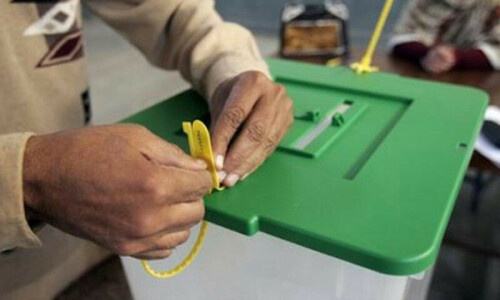Dhoke Sarang is a small hamlet, located some 8km to the north of Chakwal city. Today it has almost become a part of Dhab Pari. Chaudhry Sarang Khan laid the foundation of Dhoke Sarang in the early 19th or late 18th century.
At the outer edge of the village is a girls’ school, known as Government Girls High School, Dhab Pari. Today, 480 girls study at this school which was established in 1936 by Chaudhry Noor Khan Gandhi. However, even the brief history of the school inscribed on a plaque at the entrance does not mention the name of the founder.
This school, which shaped the social and cultural life of the area, was founded by Chaudhry Noor Khan Gandhi, the grandson of Chaudhry Sarang Khan. At the time, few boys went to school and educating girls was taboo.
“When my uncle made up his mind to establish a school for girls, a fellow villager warned him against it. He said if girls learn to read and write, they will write love letters,” narrated Noor Khan Gandhi’s eight-year-old nephew, Chaudhry Mohammad Taj.
 |
| Noor Khan Gandhi |
“My uncle responded by saying ‘love letters would be written, sent and received quietly but illiterate girls would gesture to lovers and call out to them loudly to get their attention. That why their affairs would become known to the whole village’” said Mr Taj.
Noor Khan Gandhi faced a lot of resistance from the people of his clan but he could not be deterred from his mission. He was the most powerful man in his area. So, he set up the school and his own four daughters became the first few students.
At the time, Chakwal was a tehsil of Jhelum and this school was the first girls’ school in the entire Jhelum district. Mr Taj told Dawn that the school initially began functioning as a primary school. Noor Khan Gandhi has left enough land adjacent to the school that it kept expanding.
Noor Khan Gandhi also had a hostel constructed on school premises for girls from distant villages, Chakwal city and even Rawalpindi district to be admitted to the school. “My uncle also had a well dug for girls to have drinking water. On most days the people of the village also used the well but on Sundays men were not allowed near it as the girls would wash their clothes at the well, said Mr Taj.
Noor Khan Ghandi set a new tradition of educating girls in the village. Even today, parents in the area educate girls and most women of Dhab Pari are either teachers or nurses.
Due to his services in the field of education and agriculture, the government allotted him land in Kamalia, where he built two more schools, one for boys and one for girls.
“He also donated land for a high school in Chak Naorang village,” said Chaudhry Israr Ahmed Khan, grandson of Noor Khan Gandhi.
In addition to his services in the field of girls’ education, Chaudhry Noor Khan Gandhi was a philanthropist, a soldier, a revenue officer, a politician, a Khaksar and a great reformer.
Although his date of birth is uncertain, but according to one of his grandsons, Chaudhry Shauque Iqbal, he died on November 7, 1971 at the age of 95.
“My grandfather passed 8th grade exams from Government Middle School Bhoun which was the only middle school in the area. He studied despite opposition from his mother. Only his aunt was in the favour of his education,” said Chauhdry Israr Ahmed Khan, another of Noor Khan Gandhi’s grandsons.
“Being a chaudhry, an influential person with a large land holding, Noor Khan Gandhi was recruited in the Rasala Battalion (a battalion of horse riders) in the British Army. During the First World War he served in France and retired as Rasaladar,” narrated Mr Taj.
Noor Khan Gandhi along with Khan Sarfraz Khan another influential person of Chakwal was also recruited in the revenue department but he soon left the job and joined the newly founded Muslim League.
At the time both Muslim League and Indian National Congress were working together for India’s liberation and Noor Khan Gandhi emerged as the torchbearer for Gandhi’s Swadeshi Movement which boycotted all British made products. The aim was to revive local industry and traditional methods. His political ideologies won him the title of ‘Gandhi’.
Chaudhry Israr Ahmed Khan said his grandfather wore handspun khaddar fabric all his life and convinced others to do the same. He discouraged wearing gold ornaments and accepting dowries. “Even today in Dhab Pari, dowry is not preferred,” he said.
Although Noor Khan was a chaudhry himself, he opposed feudalism and stood for the equality in the society. For his services as a great reformer in the area, he deserves to be remembered by local authorities.
Published in Dawn, February 8th, 2015
On a mobile phone? Get the Dawn Mobile App: Apple Store | Google Play














































